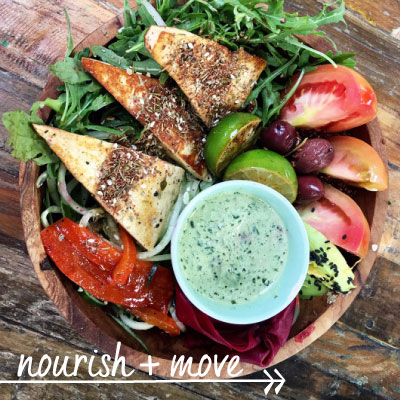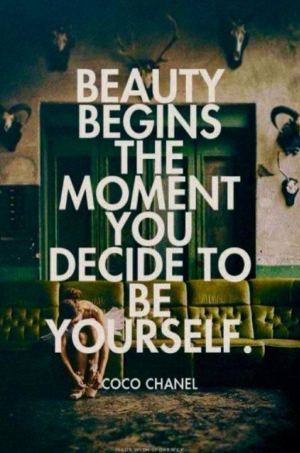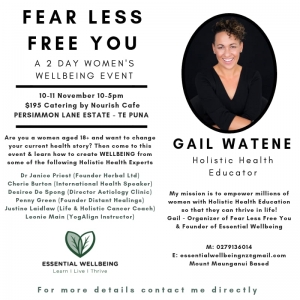
Displaying items by tag: wholistic
Yoga is the Yoking of the Mind, Body & Spirit
Here's 10 tips for helping to look after the mind - your mental health:
- Get adequate sleep. Every hour before midnight is the equivalent to two hours after, aim for eight hours per night.
- Smile more: it is scientifically proven to improve your mood. The average adult smiles seven times a day and one is usually fake. Kids smile around 400 times a day. Find your inner child and smile more!
- Eat clean, natural, real food: it has a direct correlation to your mood. Think about it: 90% of your serotonin receptors are in your gut.
- Drink more water. One sign of dehydration is a cranky mood and frontal headache.
- Be around people who love you for who you are but inspire you to be more.
- Be out in nature: let the biophilia magic rub off on you.
- Set goals and make them happen. A sense of fulfilment makes humans feel like they are thriving.
- Make a gratitude list of the things in life you are most grateful for.
- Say "I love you" to yourself.
- Be kind. When you give, you always get back.
Life is too short not to be doing what you love and experiencing the amazing things that the universe has to offer. Look after your mental health to really shine. There's so much waiting for you.
Thanks Lola Berry, author of The Happy Cookbook.
Fear Less Free You Women's Event - Join us 10-11 November in Tauranga
Join us for a beautiful & empowering women's weekend with organiser Gail Watene, Holistic Health Educator, & a wonderful line-up of professional & highly skilled women, ready to share their knowledge & wisdom, to help guide you to your optimal wellness.
For more details & information on presenters, check Gail Bosmann-Watene's post on facebook, or email Gail at This email address is being protected from spambots. You need JavaScript enabled to view it. directly, for all enquiries, & for registration.
We look forward to seeing you there at the peaceful Persimmon Lane Estate in Te Puna, Tauranga on Saturday 10 & Sunday 11 November 2018.
Balancing Act
The Freedom to live a Healthy Life requires commitment, planning, action & resilience.
Periodically re-evaluate your growth in the following areas to find your Optimal Wellness.
- Eat nutritious, seasonal wholefoods, mostly organic or spray free
- Allow yourself adequate rest & quality sleep
- Cultivate a peaceful but alert mind, open to love, joy & growth
- Social connection with family, friends & colleagues
- Regular exercise & a movement rich life including time out in nature
- Minimise exposure to environmental toxins
The Gut-Brain Connection
By Dr Libby Weaver
We’ve all heard the term ‘go with your gut’ when it comes to decision-making. But is there really such a thing as gut feelings? And just how connected is our brain with our gut?
Well, scientific research has found that our brain, our gut, and the gut microbes inside it (the different strains of bacteria that make up our gut’s ecosystem) communicate with each other. Doesn’t it just blow your mind how amazing our bodies are?
This is part of an ever-growing body of research that confirms a powerful link between our gut and our brain—more than we’ve ever realised. In fact, the gut is often referred to as our “second brain”. It has its very own nervous system (the enteric nervous system), and signals can be transmitted in both directions, meaning that our gut can send messages to our brain and our brain can send messages to our gut. This connection is termed the ‘gut-brain axis’ and it’s why when we feel anxious we can feel sick in the stomach or when we’re nervous we sometimes get butterflies. It’s also why those with IBS (irritable bowel syndrome) may notice that their symptoms worsen when they’re stressed.
Yet, many of us have become disconnected from the way we eat and the impact that it has on our bodies. We don’t always consider that it was dinner the night before that left us with a food hangover and feeling lousy the next day. We can be left thinking it’s ‘normal’ to feel exhausted at 3pm, to snap before we’ve eaten our lunch or to constantly feel bloated by the end of the day.
Our relationship with food is complex and often has a strong emotional component. Take for example a stressful day – many people might find themselves drawn to chocolate, alcohol, or takeaways, not a health-promoting bowl of broccoli and other nutrient-dense foods! If we’re feeling tired and sluggish we tend to reach for caffeine and sugary foods, anything that will give us a quick surge of energy.
This is not to mention that our emotional state can also radically impact on how we digest our food. Eating while we’re upset can potentially lead to indigestion, as digestive processes are not prioritised when the body is churning out stress hormones.
One of the things we do know about the gut-brain connection is that around 80% of the serotonin in our body (the neurotransmitter in our brain that leads us to feel happy, calm and content) is made in the gut. Which means, if gut health is compromised, serotonin production may also potentially be altered.
The good news is, the power to change our gut health is entirely in our hands. Our gut microbiome (the ecosystem of bacteria in our gut) changes according to what we eat. What’s quite remarkable is that the bacteria in our gut can change within three or four days, so even a few of days of eating poor quality foods can completely change our gut flora picture and therefore our gut health. The same goes for nourishing foods. What we eat is that powerful!
It is however, important to remember that the foods that are nourishing for one person may not be nourishing for another. I’ve lost count of the number of people I’ve met who have continued to eat foods they have been told are “healthy”, despite their body sending them clear messages (often in the form of gut symptoms!) that these foods aren’t right for them.
When we begin to pay more attention to how we feel after we eat, we can learn how to identify our body’s messages and improve our intuition around what’s right for us and what’s not. This includes what we eat and how to take better care of ourselves, but also extends beyond that to having the clarity of mind to make important decisions and the ability to get through our daily tasks without feeling overwhelmed.
So, begin to pay more attention to how you’re left feeling after each meal. It can help to jot down what you’re eating and any symptoms you experience for a couple of weeks to help you identify any common denominators that might better serve to be avoided for a trial period of time.
https://www.drlibby.com/gut-brain-connection/
Contact Leonie Main
m: +64 (0) 274 96 96 33
19B Golf Road, Mount Maunganui 3116, New Zealand
Facebook: Gypset Life







